This post is part of a larger deep dive
Curious about the role of the Planets in astrology in The Planets? Check out The Planets Explained!
Or read the full The Planets article!
This post is part of a larger deep dive
Curious about the role of the Planets in astrology in The Planets? Check out The Planets Explained!
Or read the full The Planets article!

Before explaining the relationship between the planets and astrology, it is first important to get familiar with a few concepts in astronomy, namely the ecliptic and the zodiac constellations.
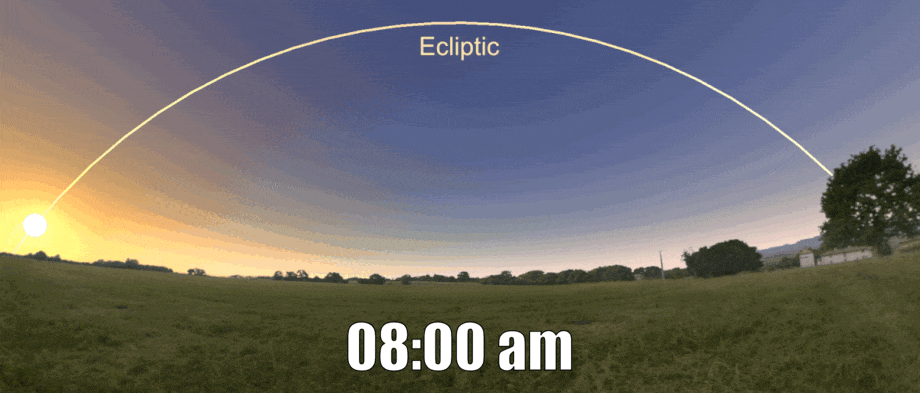
I hope it comes as no surprise to you that it is the Earth (and all other planets) that orbit around the Sun.
Now, from the perspective of someone standing on Earth, it will appear as though the Sun is moving across the sky, right? Imagine that you could trace the path of the Sun from the moment it rises in the East and sets in the West. You would be tracing something called the ecliptic (see figure above).
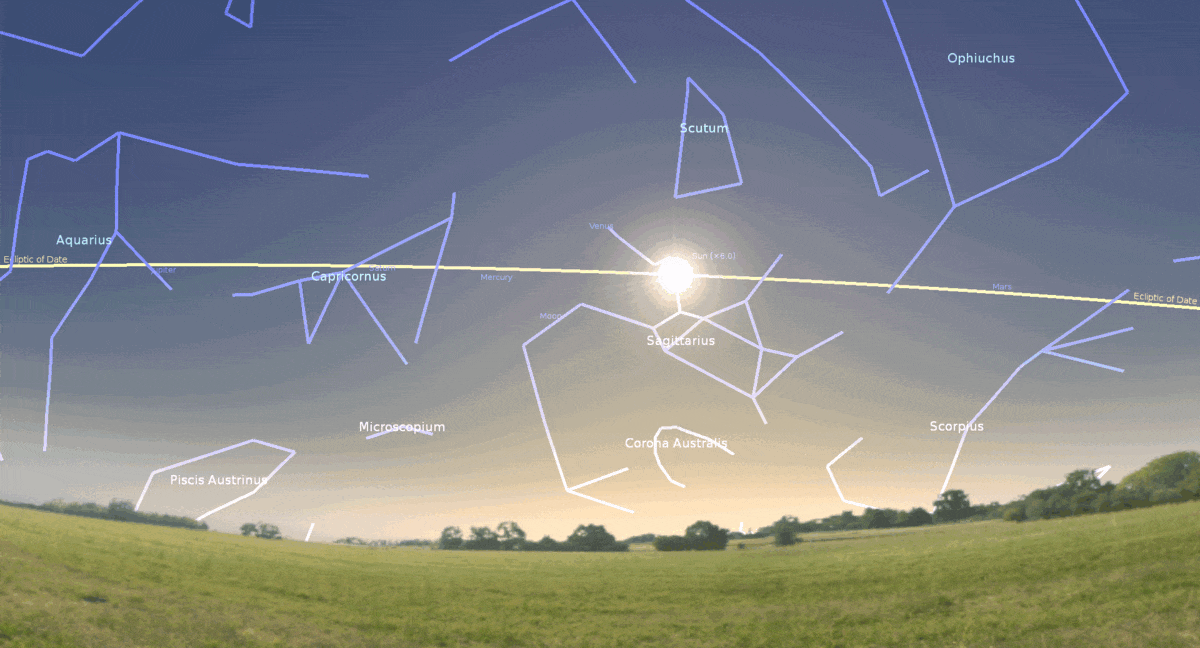
Because the sun is so bright, you don’t see any stars in the sky during daylight. However, if you were to remove the atmosphere, you would see the Sun in the foreground of a background of stars (see image above).
So, from the perspective of someone on Earth, the ecliptic is the imaginary line the Sun appears to take through the background stars.
The other planets in our solar system travel more or less on the ecliptic as well; some are a few degrees above it, some a few degrees under it, but more or less on the ecliptic plane (e.g., in the image above you can just about spot Jupiter close to Aquarius and Venus close to Sagittarius).
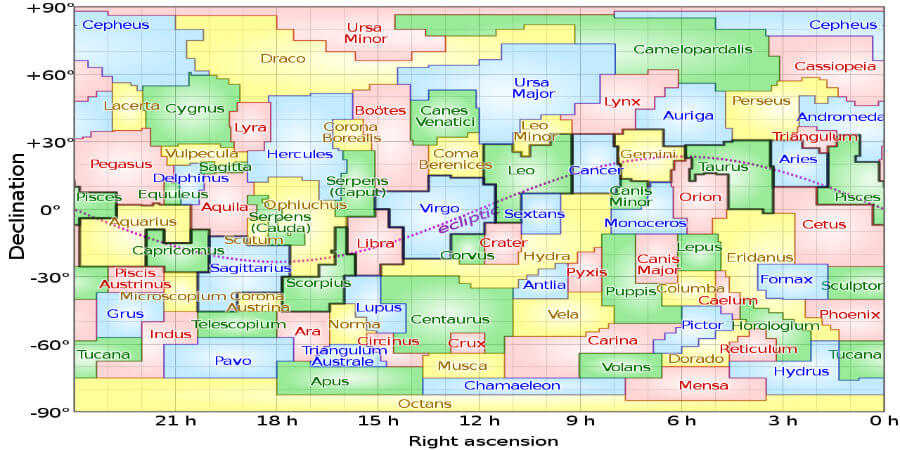
When you look up in the sky you can see many stars right? Ancient civilizations all over the world found it helpful to group some of these stars together and give them names – these became the constellations.
Nowadays, every farmer knows that we should sow in the spring and harvest in the fall. However, before the invention of calendars, people had no clue when they should start sowing or harvesting.
So, they relied on patterns of stars in the sky (the constellations). For example, when the constellation of Orion was beginning to become fully visible, people would know that winter was approaching, a cue to start harvesting. Similarly, whenever they spotted the Summer Triangle they would know spring had arrived, their cue to start planting.
Constellations also helped in navigation. Sailors would use the night stars and constellations to navigate their ships across entire oceans, helping them discover continents like America and Oceania.
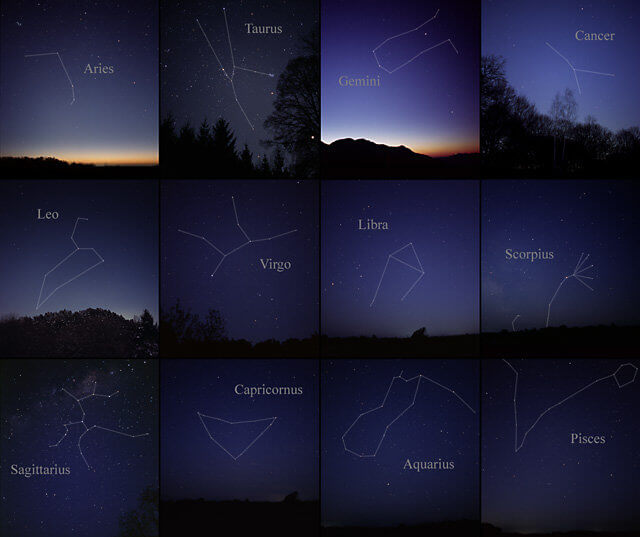
At present, there are about 88 constellations named by humans, but there are 13 that are particularly well-known: the constellations of the zodiac. They are Aries, Taurus, Gemini, Cancer, Leo, Virgo, Libra, Scorpio, Ophiucus, Sagittarius, Capricorn, Aquarius and Pisces. Each is associated with a specific object or animal, but most do not look anything like it.
In astronomy, there are indeed 13 constellations of the zodiac.
Apart from the 12 well-known constellations that are also the names of the astrological signs, there is another constellation lying between the constellation of Scorpius and Sagittarius called Ophiucus. It is visible between the 30th November and 18th December.
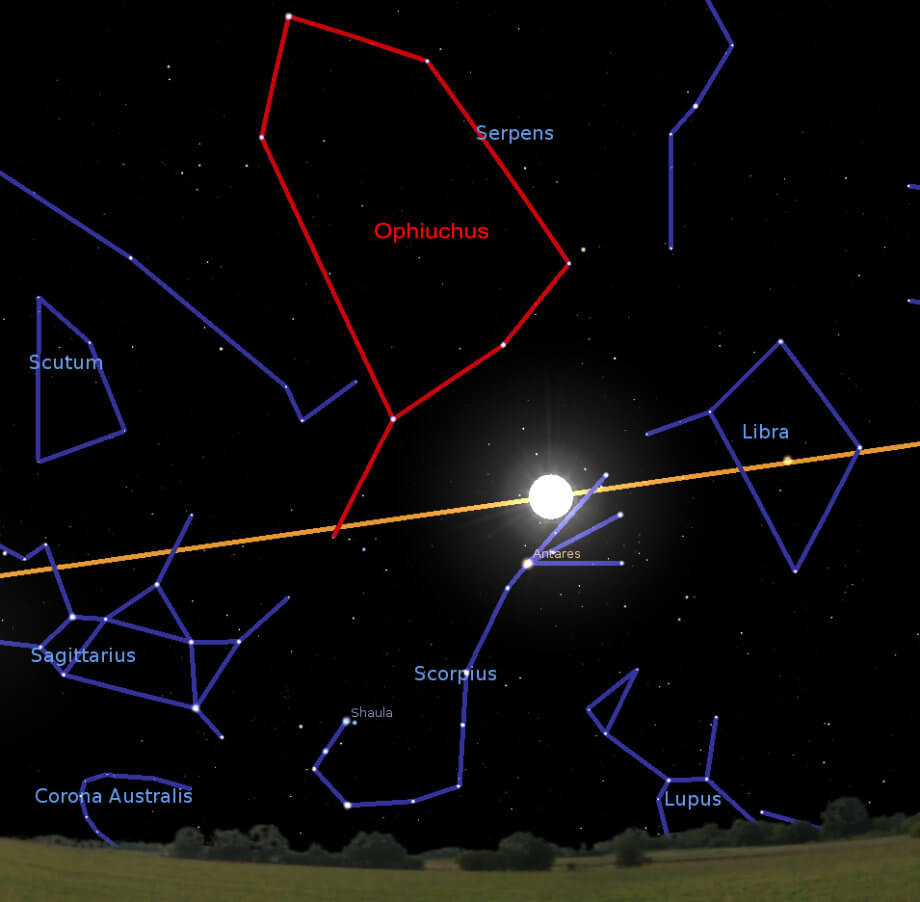
Ophiucus is a relatively large constellation (highlighted in red in the image above) and, importantly, it crosses the ecliptic (the yellow line in the image above). So why have astrologers ignored it?
One of the reasons could be due to the fact that if you include Ophiucus, the number of constellations would be 13, a number which has been traditionally associated with bad luck.
Another reason might be that astrologers divide the sky into angles of 30 degrees, which multiplied by 12, gives us 360 degrees, the extent of the ecliptic plane. Now, with 13 constellations that number would be 360/13 = 27,692307… which is not as much of a clean number as 30 degrees.
The problem is that the Sun is in Scorpius for only 6 days, whereas it is in Ophiucus for about 20 days. So astrologers decided to fuse Scorpius with Ophiucus so that the time is closer to the 30 days mark.
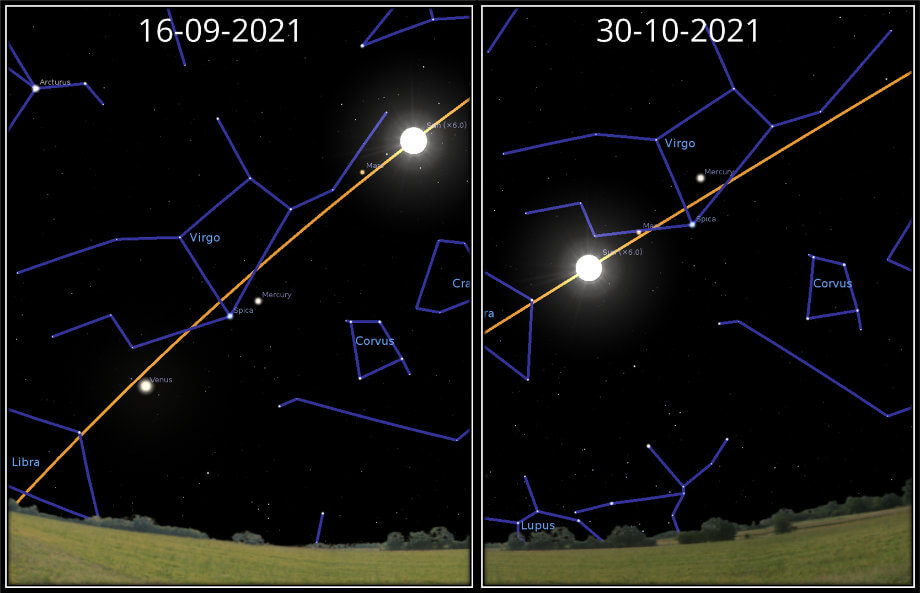
Now, because the sun rays are so bright, you cannot see any stars during the day. However, if you were to remove the atmosphere, you would see the Sun more or less “in front” of one of the 13 constellations of the zodiac.
The amount of time the sun spends on each constellation varies from approximately 5 days (Scorpio) to about 44 days (Virgo; see image above).
Now, there are only 12 zodiac signs in western astrology. This is because astrologers decided that Ophiucus should be merged with Scorpius, resulting in the 12 constellations that any astrology fan can recognise (check Say what?!? Ophiucus?!? Not in my horoscope list…)
12 is also a nice number because you can divide 360 degrees (the ecliptic plane) by 12 and you get 30 degrees of celestial longitude (30 degrees is more or less the distance the Earth revolves around the Sun in a month).
I’m afraid yes!
You see, the Earth is not a perfect sphere so it’s mass is not distributed equally. Because of this, Earth wobbles around itself like a spinning top. This is called precession.
At the time of the Babylonians (2nd Millennium BC, when astrology was invented), the position of the Sun in the zodiac constellations more or less matched their astrological equivalent. For example, people born in early October were in fact Libra because, at the time of the Babylonians, the Sun was indeed in Libra in early October.
But that was 2500 years ago!
As I mentioned above, the Earth wobbles on itself. With each change in “wobbling” the constellations slide significantly eastwards. On an average human life that sliding is only about one degree (which is insignificant). But over 2500 years it starts to add up.
In fact, since 2500 years ago, the Earth precession has changed about 30 degrees. That means that if you were now born on the 21st of February, your astrological sun sign will be Pisces. However, on that day, the Sun was actually travelling the constellation of Aquarius (Aquarius is 30 degrees eastward of Pisces).
In order for the constellations to be in the same position as that for the Babylonians, we will need to wait about 22,000 years (it takes 26,000 years for Earth to complete one full “wobble”).
Just as the Sun “travels” by the zodiac constellations in the sky, so do the other planets of our solar system (see figure above).
For example, if you were born in February 21st, your Sun astrological sign would be Pisces (even though the Sun would actually be in Aquarius; see left image above). If Jupiter happened to be in the constellation of Capricornus at the time of your birth, then you would have “Jupiter in Capricornus”.
If, instead, you were born in June 29th, your Sun astrological sign would be Cancer (even though the Sun would actually be in Gemini; see right image above). If, at the time of your birth, Mercury happened to be travelling by the constellation of Taurus, then it is said you have “Mercury in Taurus”.
Also note that two or more planets can occupy the same constellation. For example, if Mercury and Saturn were both in Virgo, then both Mercury and Saturn would be in Virgo.
Most astrologers consider the 5 first planets counting from the Sun (Mercury, Venus, Mars, Jupiter and Saturn) as the most important; they are considered the personal planets, because they are closer to Earth.
More specifically, the Sun, the Moon, Mercury, Venus and Mars reflect how people behave, whereas Jupiter and Saturn reflect our social tendencies.
Uranus, Neptune and Pluto are considered to be the transpersonal planets in Astrology.
Conveniently, each planet has at least one keyword which describes the essence of that planet, so you can get the gist of each planet’s character:
| Planet | Keyword |
|---|---|
| Mercury | Communication |
| Venus | Love |
| Mars | Activity |
| Jupiter | Expansion |
| Saturn | Restriction |
| Uranus | Revolution |
| Neptune | Imagination |
In the next sections I will expand on the ideas behind the astrological significance of these 7 planets (I’ll focus on only 7 of the planets: Mercury, Venus, Mars, Jupiter, Saturn, Uranus and Neptune, since these are the planets we encounter in Holst’s composition).
I will also give some examples of how astrologers might interpret the planets depending on which zodiac constellation they are positioned in.

In Roman mythology, Mercury is the god of communication, commerce and messages.
He is considered to be the messenger of the gods, and is often depicted wearing winged sandals and a winged hat, and carrying a caduceus.
It was Mercury who, according to mythology, was in charge of guiding the souls of the dead to the boatman Charon, who would then ferry the souls down to the underworld.
In astrology, Mercury is associated with learning, intelligence, and everything related to communication. It determines the way you think, how you use language and express yourself, as well as the speed with which you process information and understand facts.
Mercury in Aries
If you are Aires and ruled by Mercury, you will be very assertive and will not hold back your opinions. Your mind is always racing, so you might at times be slightly impatient and even find hard to concentrate.
Mercury in Gemini
Aided by your extraordinary curious and percepive mind, you are a very intelligent person. If you need to juggle several tasks, you don’t falter. Your agility to roam new environments and adapt to new circumstances is legendary.

Venus is the brightest “star” you can see in the sky. Perhaps for this reason, many ancient cultures associated this planet with the goddess of love. According to mythology, Venus was the unfaithful wife of Vulcan, who nearly caught her in the act with Mars.
Thus, astrologers have found it pertinent to associate the planet Venus with things like love, seduction, beauty and pleasure.
How you deal with, and express your affections and desires has to do very much with planet Venus. It is also Venus who is responsible for the quality of your interactions with other people, whether those interactions are friendly, social or purely sexual.
In general terms, Venus represents your entire romantic spectrum.
Venus in Virgo
If Venus is in Virgo, you approach your romantic quests with honesty and maturity. Once you fall in love, you are completely engaged, exploring every nook and crannies of the relationship. You don’t leave anything to chance. Being a fully devoted partner, it could sometimes mean that you are slightly controlling and critical.
Venus in Sagittarius
Love should be an adventure to you, so when you look for a partner, you tend to value qualities such as openness to new experiences, travelling around the world, and so on. You avoid being chained away into stagnant relationships, even if they feel secure. People with strong personalities and diverse interests captivate you, even if they raise other people’s eyebrows.

Mars has a slight red tint when you look up in the sky. For this reason, many ancient cultures associated this planet with destruction and death.
In Roman mythology, Mars is the god of war, so many astrologers have associated Mars with many negative aspects, such as violence, anger, dishonesty and bad temper.
However, there is also a positive side. Mars is geared into action. He is strong, determined, energetic and courageous. Inactivity is something alien to Mars; when he sets his mind he makes sure he will get it.
So, more generally, Mars represents your tenacity, energy, ambitions and desires as well as your ability to take on new ventures.
Mars in Aires
You are as brave as you are impulsive, which may sometimes put you in precarious situations. You are known for bouts of emotional explosions, which you may find difficult to control. But that energy and enthusiasm make you an excellent leader, and you don’t shy away when you are in the spotlight.
Mars in Libra
Despite being an easy-going and friendly individual, you might struggle to assert yourself. You don’t like conflicts, so you often avoid war and will always seek harmony. But that behaviour comes at a price. By trying to look at all sides of the problem in order to reach the most harmonious conclusion can result in indecisiveness. So you might have difficulties making decisions, even ones that only relate to you.

Being the largest planet in our solar system, Jupiter was named after the king of the gods: Jupiter Optimus Maximus.
So it isn’t surprising that astrologers found that attributes such as abundance, optimism, growth and cheerfulness, best characterised this planet. Jupiter is the bringer of luck, opportunity and success, although it can also express overindulgence.
Jupiter in Taurus
You are someone who relishes pleasure and material things, so sometimes you may fall prey to some self-indulgence. Nevertheless, you are not an unreasonable person, and your affinity for practical things often means you make wise choices (such as saving money).
Jupiter in Scorpius
You are a reserved but perspicacious individual, with a genuine interest in getting to know more about the subject of your inspection. You are also ambitious and proud in your endeavours, characteristics which could be helpful in pursuing your passions.

In mythology, Saturn is equivalent to the greek god Cronus, the god of time.
Astrologers associate Saturn with discipline, organisation and accomplishment.
Essentially, Saturn drives you to find solutions to existing problems, to get organised and to push your limits. Whenever you feel down, lazy or face obstacles of any kind, Saturn will force you to fight back and never conform.
Saturn in Cancer
Possibly as a result of a difficult childhood, you may experience feelings of insecurity and emotional dependance later in life. You will have a tendency to seek ways to fill that lacuna. This could bring a bunch of problems. For example, you may become needy in your romantic relationships, or you may act super-confident or indifferent in order to mask your vulnerabilities.
Saturn in Aquarius
If Saturn rules Aquarius, then you will be someone with the ability of persuasion (the good kind). You are just, kind, creative and cognitively flexible. These traits enable you to understand your place in society as a constituent part working towards a common goal. In addition, you feel that you only strive if you live according to your own values, which are mostly noble and not so much related to material objects.
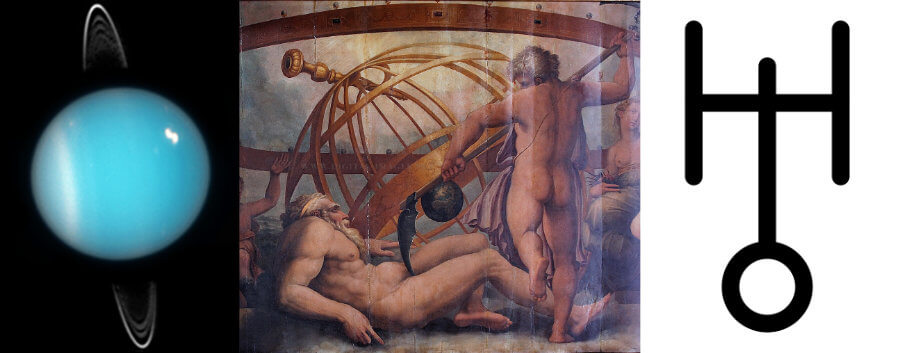
In astrology, Uranus is considered the planet of technology, revolution and modern age.
In personal terms, it reflects that side of you that is inventive and creative, and attempts to break away from convention. In this sense, it can help generate those “Aha!” moments when you least expect.
Although Uranus’ influence can lead to life-altering events (e.g., a promotion, a significant scientific discover), it can also induce disruptive states of mind and less appealing consequences (e.g., unexpected break-up, housing predicament, financial problems).
Uranus in Leo
While you are a creative and talented individual who revel in exciting and challenging projects, you can at times be arrogant and vain. You also don’t mind unconventional romantic relationships, in fact, you actively seek them.
Uranus in Capricorn
If there is something you cannot stand is to live a life according a particular set of rules. This will have an impact on your career. For example, if your workplace is conducive for expressing your individuality, then you will do great. However, if your individuality is unwelcome, then you won’t conform.

Neptune is the god of water and sea in Roman mythology, but in astrology, the planet symbolises the occult, as well as intuition, imagination and dreams. It is in Neptune where your artistic ability comes off, be it expressed in dance, music or any other art.
The more negative aspects of the planet are the increase risk of addiction, hypochondria, social withdrawal and aimless drifting.
Neptune in Scorpio
You are someone who is fascinated by the workings of the mind. You will tend to look into the occult arts, dream interpretation. However, you might also be more prone to self-destructive behaviour.
Neptune in Pisces
Astrologically, Neptune is currently in Pisces (as of 2022), so individuals born between 2012 and 2026, are often empathetic and generous, highly artistic with a penchant for fantasy, cinema and music. On a more negative side, these individuals may exhibit addictive tendencies and self-destructive behaviour.
Thank you for writing such an in depth analysis of the planets and including some basic info about astrology which I knew nothing about. I really enjoyed reading it and found it very informative. Read it whilst listening to the music.
Hi Jessica,
Thank you for your comment! I’m really happy you found the article an enjoyable read!